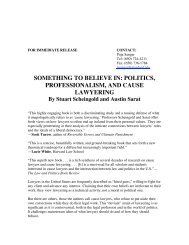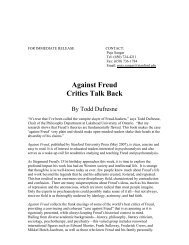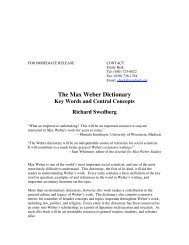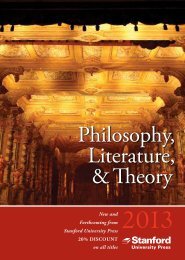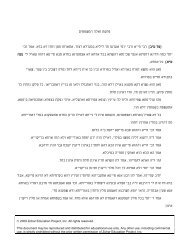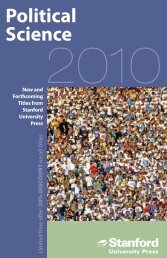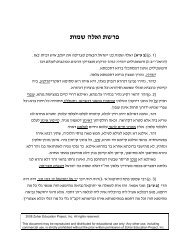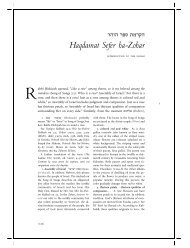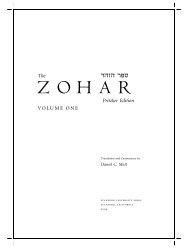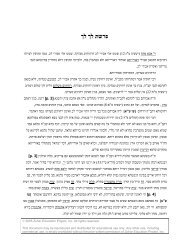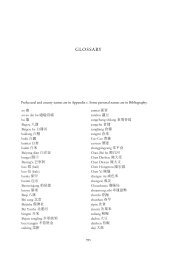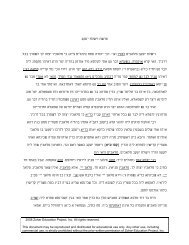CHINA'S TECHNO-WARRIORS: - Stanford University Press
CHINA'S TECHNO-WARRIORS: - Stanford University Press
CHINA'S TECHNO-WARRIORS: - Stanford University Press
Create successful ePaper yourself
Turn your PDF publications into a flip-book with our unique Google optimized e-Paper software.
FOR IMMEDIATE RELEASE<br />
CONTACT:<br />
Puja Sangar<br />
Tel: (650) 724-4211<br />
Fax: (650) 736-1784<br />
Email: puja.sangar@stanford.edu<br />
CHINA’S <strong>TECHNO</strong>-<strong>WARRIORS</strong>:<br />
NATIONAL SECURITY AND STRATEGIC COMPETITION<br />
FROM THE NUCLEAR TO THE INFORMATION AGE<br />
BY EVAN A. FEIGENBAUM<br />
"A wonderfully multi-dimensional book on a subject about which little has been<br />
written. It has the added virtue of making its new material relevant to current<br />
academic and policy issues, including U.S. export controls, China's entry into the<br />
WTO, globalization, and China's economic and military modernization."<br />
—David M. Lampton, Director, China Studies,<br />
Nitze School of Advanced International Studies,<br />
John Hopkins <strong>University</strong><br />
"Draws on materials that have seldom been used before, in new ways, to make a<br />
very bold argument about the Chinese state and high technology development in<br />
China."<br />
—David Bachman, Director, China Studies,<br />
Jackson School of International Studies,<br />
<strong>University</strong> of Washington<br />
In the spring of 1987, the founding father of China’s strategic missile program,<br />
Qian Xuesen told colleagues that China must steel itself for a century of<br />
sustained "intellectual warfare." Evan A. Feigenbaum, the author of China’s<br />
Techno-Warriors: National Security and Strategic Competition from the Nuclear to the<br />
Information Age (April 2003 from <strong>Stanford</strong> <strong>University</strong> <strong>Press</strong>), contends that the<br />
use of such military metaphors by Chinese scientists and politicians is not a<br />
linguistic quirk, but reflects the role of the military in China's emergence as a<br />
modern state.
This book tells the story of how and why the Chinese military came to play such<br />
a pivotal role in China’s economic development. Feigenbaum describes the<br />
powerful role played by the People’s Liberation Army and its technical advisors<br />
in economic and institutional debates, and details the programmatic and<br />
organizational solutions they have advocated to the key problems of China’s<br />
development. Although this military-influenced approach to development first<br />
emerged between 1950 and 1969, during China’s period of greatest external<br />
threat, these ideologies, policies, and management methods continue to manifest<br />
themselves even as the PRC has come to enjoy a relatively benign strategic<br />
environment.<br />
The persistence of such patterns in China's economic policy and defense<br />
planning results from a complex interplay between domestic power politics and<br />
China's technological weakness. While the country is rapidly catching up in<br />
many sectors, such as computing, its indigenous technology base in key strategic<br />
industries lags behind, particularly in microelectronics and related industries. In<br />
these areas, China has long depended on imported systems and know-how.<br />
According to Feigenbaum, "With a technology base that remains ten to twenty<br />
years behind international standards in so many areas that China's leaders<br />
consider to be 'strategic,' [Chinese] strategists must hedge against uncertainty in<br />
a world whose international politics could change radically at any time." The<br />
intersection of national security and economic development objectives thus<br />
continues to buttress a uniquely military approach to China’s modernization.<br />
At a moment of rapid globalization and the emergence of new security risks in<br />
East Asia, this book is crucial in developing a deeper understanding of the China<br />
that is emerging onto the international stage as a major power.<br />
Evan A. Feigenbaum, currently serving as a Member of the Secretary's Policy<br />
Planning Staff at the U.S. Department of State, has taught Chinese foreign policy<br />
at Harvard <strong>University</strong>, where he has been Lecturer on Government in the Faculty<br />
of Arts and Sciences and Executive Director of the Asia-Pacific Security Initiative<br />
at the John F. Kennedy School of Government. He is the author of Change in<br />
Taiwan and Potential Adversity in the Strait.<br />
360 pp.<br />
$55.00 (cloth) 0-8047-4601-X<br />
To order, please visit our website at www.sup.org.



